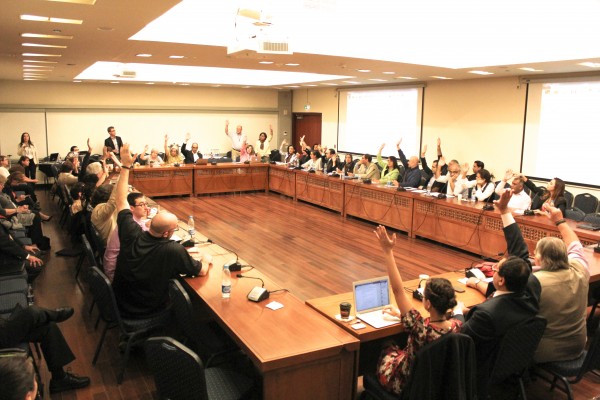BY NADINE AWADALLA
@nadinetweetstoo
![Glavanis is fears that if the Senate does not come together it could lose its effectiveness [Kodos]](http://www.auccaravan.com/wp-content/uploads/2014/11/IMG_9084-e1416251178617.jpg)
Senate Chair Pandeli Glavanis has told the Caravan that he is dissatisfied with the way the university’s governing body is dealing with controversial issues.
Last week, a regularly scheduled Senate session concluded with members voting down a modification to a previously passed draft resolution, which had addressed these issues.
In October, the Senate passed by 92 percent a resolution which said “that any unilateral policy changes by the administration that contradict the policies and procedures outlined in the faculty handbook are deemed to be breaches of contract and good faith”.
However, President Lisa Anderson later rejected the resolution telling the Senate that she could “not affirm [it] largely because I don’t think it was a breach of good faith”.
The Senate’s Executive Committee drafted a modified resolution, which was ultimately voted down by 62 percent of the Senate after back-and-forth exchange about the wording of the resolution.
“I think the Senate has proven itself to be incompetent and unable to handle the responsibility of sharing in the governance of the university,” Glavanis told the Caravan.
“I think we’re playing childish games of who is right and who is wrong … this can affect much more important issues; promotion, tenure, pensions, and so on,” he added.
Marco Pinfari, the senator for the Political Science department, disagrees with Glavanis.
“[The Senate] is certainly establishing itself as a more assertive body than in the recent past. I feel that this development should be welcomed by anybody who believes that the governance of our university needs more checks and balances,” Pinfari said.
He said that the Faculty Handbook is considered a fundamental aspect of the faculty member’s employment agreement, which is why some faculty are strongly opposed to the idea that benefits included in such an ‘‘integral part of our work contract can be revoked unilaterally”.
“Not least, because this would set a very dangerous precedent,” Pinfari added.
He said that the current debate about the additional bus fees is only part of a larger problem – that such changes could be carried out before the Senate modifies the Faculty Handbook, which says “AUC has provided an extensive bus system that is designed to provide comprehensive and flexible service” free of charge to all faculty members.
Faculty and staff members above level nine were informed at the beginning of the semester that they would have to pay for the bus service.
The fees would be automatically deducted from their paychecks. Some faculty members said this would be a breach of contract.
But Glavanis said that bus fees issue had been on the Senate’s agenda since the end of 2013.
“Last year, we had the president’s commission on the financial crisis and [that included] four members [each] of the Senate, the American Association of University Professors, the syndicates and Student Union,” he said.
He added that said commission agreed in November 2013 that bus fees would be imposed on faculty.
The issue was then posed to the Senate and due to opposition from the members, no vote took place.
Senate resolutions come into effect in the following academic year and as no progression in the discussion took place, the administration incorporated the imposed bus fees into the budget.
But implementation of the new bus scheme has been disorganized and uneven.
Faculty and staff must first register for the service and then pay the fee; however, some ignored the process altogether and continued to use AUC transportation without paying the charge.
Glavanis said he is partially to blame for the current impasse in the Senate.
“I, as chair of the previous Senate, take on responsibility for not having resolved this problem last year when it came up,” he said.
Anderson also said that the administration had not fully involved the Senate in some key issues.
“I think in the last few years, in part because of the unprecedented strain to the university, we have lost sight of the fundamental basic operations that we should be honoring in the relationship between the senate and the administration,” Anderson told the Senate.
